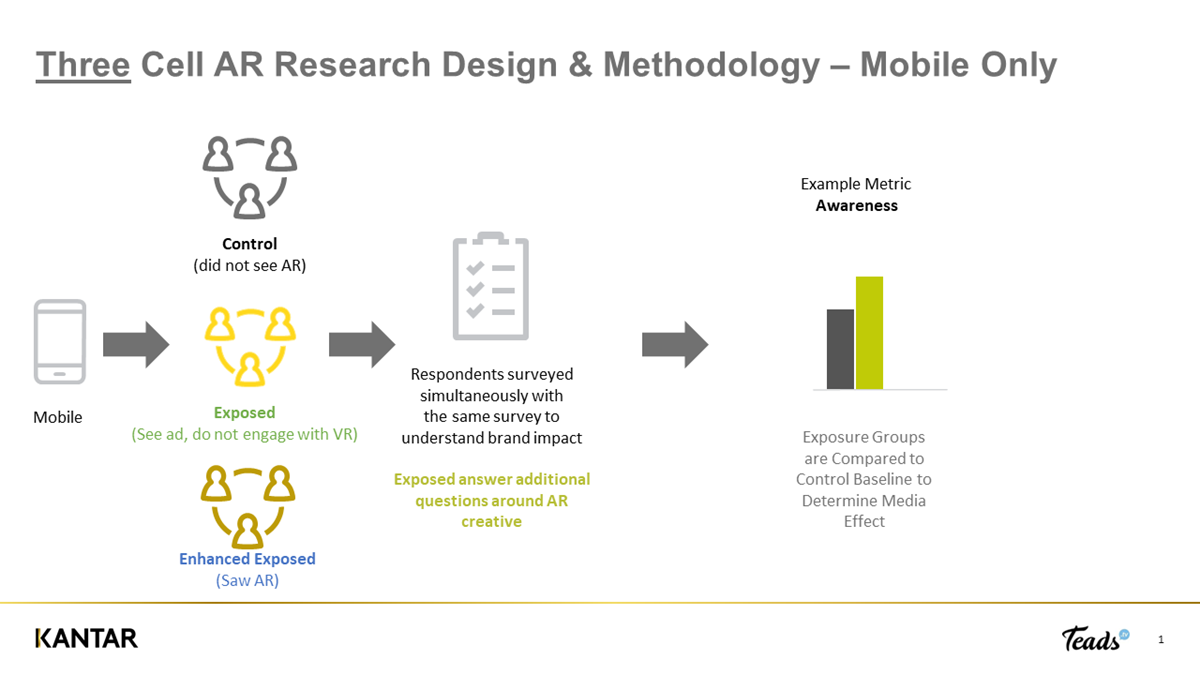
Kantar Teads AR campaign effectiveness
By Kantar - More London - London
For Teads Brand Allegra
Highly Commended in category Progressive
Use of Mobile

Project Description
Pharmaceutical advertising is tough. A: low engagement category, full of terms and conditions and regulatory restrictions. Allegra, an allergy-relief drug owned by Sanofi, has put augmented reality (AR) at the heart of its brand transformation in Brazil. The Allegra mobile-advertising campaign in Brazil was identified as the perfect candidate to test the effectiveness of AR in advertising.
Teads created a highly engaging and interactive ad for Allegra, using Teads inRead AR creative format. Anyone who interacted with the brand’s ads could depict the effect of various symptoms with their mobile camera. This was a strategic choice as Sanofi realized that allergy sufferers don't necessarily take the symptoms seriously and they tend to postpone treatment. Guido Merighi Buitoni, global head/digital business transformation, Sanofi: ‘There was a need to start from a basic understanding of our consumer needs, which was [achieved by] observing consumers. We realized that they don't necessarily take the symptoms very seriously, and they tend to postpone treatment. So, we felt there was a need to bring to life the experience of the symptoms. In leveraging the interactive capabilities of augmented reality, the goal was not only to empathize with individuals that are battling allergies. The wider aim, and a prospective nudge for people to address these problems, was to make consumers feel, almost, the issues and pain that they feel when they have one of these symptoms.’
Teads created a highly engaging and interactive ad for Allegra, using Teads inRead AR creative format. Anyone who interacted with the brand’s ads could depict the effect of various symptoms with their mobile camera. This was a strategic choice as Sanofi realized that allergy sufferers don't necessarily take the symptoms seriously and they tend to postpone treatment. Guido Merighi Buitoni, global head/digital business transformation, Sanofi: ‘There was a need to start from a basic understanding of our consumer needs, which was [achieved by] observing consumers. We realized that they don't necessarily take the symptoms very seriously, and they tend to postpone treatment. So, we felt there was a need to bring to life the experience of the symptoms. In leveraging the interactive capabilities of augmented reality, the goal was not only to empathize with individuals that are battling allergies. The wider aim, and a prospective nudge for people to address these problems, was to make consumers feel, almost, the issues and pain that they feel when they have one of these symptoms.’
Agency Solution
The long-term partnership between Kantar (Insights, Media Division) and Teads (Global Intelligence) was instrumental to come up with the right approach to measure the effectiveness of this new-to-market format.
Kantar’s newest ad effectiveness measurement approach, Context Lab, proved to be the best suited solution. The solution helps brands, agencies and publishers to understand the incremental impact of a creative in context, by dynamically replacing content within a user’s own environment. The incremental brand impact is based on the comparison of a control group and an exposed group response to the tested content. While Context Lab retains that same fundamental method, it uses a new approach to expose the creative in specific contexts.
Kantar has developed this solution to enable testing of efficacy of advertising on the live site or app without the involvement of the test site. This allows to control advertising showing on the site to recruited panelists, so Kantar can expose them to the test brand ads within the context of the live site, without a live campaign.
For the Allegra campaign, adults 18-54yo were interviewed. Those exposed had the opportunity to activate the front-facing camera on their mobile and interact with the augmented reality feature. They could test effects of different allergy symptoms such as watery eyes. The control group only answered survey questions and had no exposure to the campaign content.
Rather than downloading an app to capture and share this AR assisted content, the ad units were served in numerous web browsers, removing another unwanted irritation for many digital consumers, as they did not have to clutter up their phones with a space-hogging branded tool.
Kantar’s newest ad effectiveness measurement approach, Context Lab, proved to be the best suited solution. The solution helps brands, agencies and publishers to understand the incremental impact of a creative in context, by dynamically replacing content within a user’s own environment. The incremental brand impact is based on the comparison of a control group and an exposed group response to the tested content. While Context Lab retains that same fundamental method, it uses a new approach to expose the creative in specific contexts.
Kantar has developed this solution to enable testing of efficacy of advertising on the live site or app without the involvement of the test site. This allows to control advertising showing on the site to recruited panelists, so Kantar can expose them to the test brand ads within the context of the live site, without a live campaign.
For the Allegra campaign, adults 18-54yo were interviewed. Those exposed had the opportunity to activate the front-facing camera on their mobile and interact with the augmented reality feature. They could test effects of different allergy symptoms such as watery eyes. The control group only answered survey questions and had no exposure to the campaign content.
Rather than downloading an app to capture and share this AR assisted content, the ad units were served in numerous web browsers, removing another unwanted irritation for many digital consumers, as they did not have to clutter up their phones with a space-hogging branded tool.